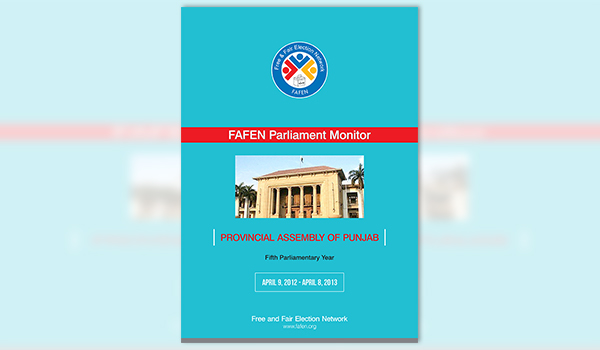As the Punjab Assembly grappled with the question of creating new provinces in the fifth parliamentary year, it passed bills to set up universities and curtail the trend of protracted litigation in disposing of land cases as part of the reforms package the provincial government announced for women, besides adopting the federal laws on the subjects devolved to the provinces under the 18th constitutional amendment. Overall the focus of legislation was education, women empowerment and the matters related to land and property.
In the nine sessions comprising 44 sittings in the fifth parliamentary year, the proceedings were marked by late starts, low attendance, absence of Chief Minister and the Leader of the Opposition, members’ low participation, repeated agenda and frequent tussles between the treasury and the opposition benches. Besides a shoe-throwing incident in the 38th session, the house business continued to be marred by frequent instances of using unparliamentary language and brawls in the house.
The provincial assembly passed 39 bills – 24 seeking amendments in the existing laws and the rest new pieces of legislation – and adopted 14 resolutions in the fifth parliamentary year. Of the amendment bills, seven were passed to incorporate the federal laws on the subjects devolved to the provinces after 18th amendment. Creation of new provinces and continuity of democracy were among the important issues on which resolutions were adopted.
The Punjab Assembly passed various bills to safeguard and protect the rights of women as part of the Punjab Women Empowerment Package introduced by the provincial government on the eve of International Women’s Day on March 8, 2012. The assembly passed four bills to establish universities – three universities for women in Faisalabad, Sialkot, and Bahawalpur – and an Information Technology University in Lahore.
Besides the legislation to establish universities for women at various places, the house passed the Punjab Partition of Immovable Property Bill and amended the Punjab Land Revenue Act 1967 to curtail protracted litigation over partition of land and property, especially the cases involving women.
Protecting women’s rights of inheritance, the two bills discourage lengthy litigation in the way of their share in joint property and call upon the respective departments to resolve such cases within six months.
The Punjab Assembly also passed the Punjab Protection against Harassment of Women at the Workplace (Amendment) Bill 2012. The legislation, an amendment to the federal law, provides protection to the working women against any sexual harassment, intimidation or harm to them at the public and the private working places.
Following the Supreme Court’s ruling about the age and qualifications of vice chancellors in the case of University of Health Sciences’ vice chancellor, the Punjab Assembly passed five bills to amend the laws of various universities to evolve a uniform procedure for the appointment of vice chancellors, nomination of pro-vice chancellors, and rationalizing the emergency powers of vice chancellors.
The Lahore Canal Heritage Park Bill 2012 was another legislation by the provincial assembly on the direction of Supreme Court. Declaring the green belts on both sides of the canal in Lahore as “public trust” in the case of Lahore Canal Bank Road Widening Project, the court had advised the provincial government to enact legislation to preserve it as a “heritage park”.
The Punjab Metro Bus Authority Bill, passed amid reservations by the opposition benches, provided for construction and maintenance of mass transit system in the major cities of Punjab starting from Lahore. The house also amended the Provincial Motor Vehicle Ordinance 1965 to exempt the buses of Metro Bus Service from the route permit. School buses were also extended the same facility.
However, the outgoing assembly failed to give a new local government system to the province as the Punjab Local Government Bill 2012, introduced in the assembly on June 7, 2012, was not passed. As in the four years, the house continued to amend the Local Government Ordinance 2001 in the fifth parliamentary year to delay the holding of local government elections – a constitutional requirement.
Though the Right to Information Bill was approved by the Punjab cabinet on March 11, 2013, it was not introduced in the assembly. PMLN and PPP – the two major parties in the Punjab Assembly – had agreed in the Charter of Democracy that legislation about access to information will be made.
The resolutions on creating new provinces highlighted the tense relations between the ruling parties – PPPP and PMLN – in the center and the Punjab. The National Assembly passed the government backed resolution on May 3, 2012 calling upon the Punjab Assembly “to present a bill in the Punjab Assembly to amend the Constitution in accordance with Article 239(4) of the Constitution…for passage which would have the effect of altering the limits of province of the Punjab, thereby creating 1 Province of Janoobi Punjab.”
However a week later on May 9, 2012 the Punjab Assembly adopted two resolutions calling for restoring the status of Bahawalpur as province and called upon the federal government to “establish Janoobi Punjab province…and also setting up a national commission that shall immediately decide all important issues.” The main opposition parties in the Punjab Assembly – PPPP and PML – backed these two resolutions.
The resolution on restoring the Bahawalpur province was seen as a move to counter the National Assembly’s resolution for the new province in Southern Punjab.
For complete report click here









